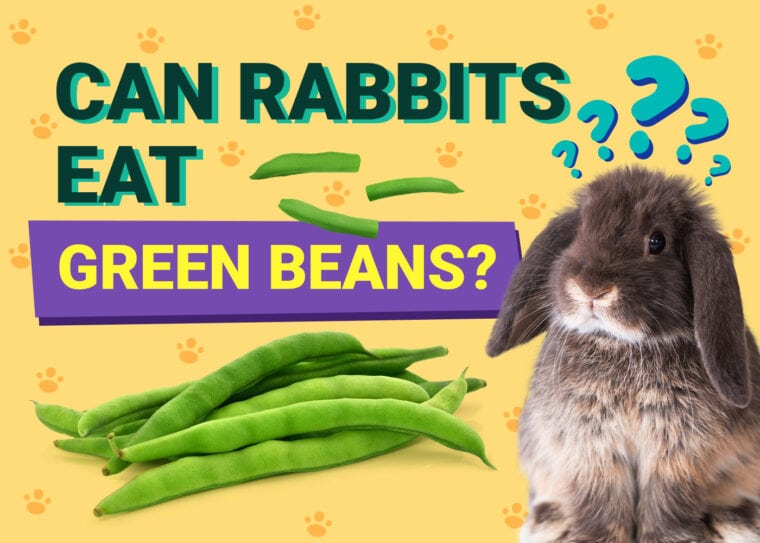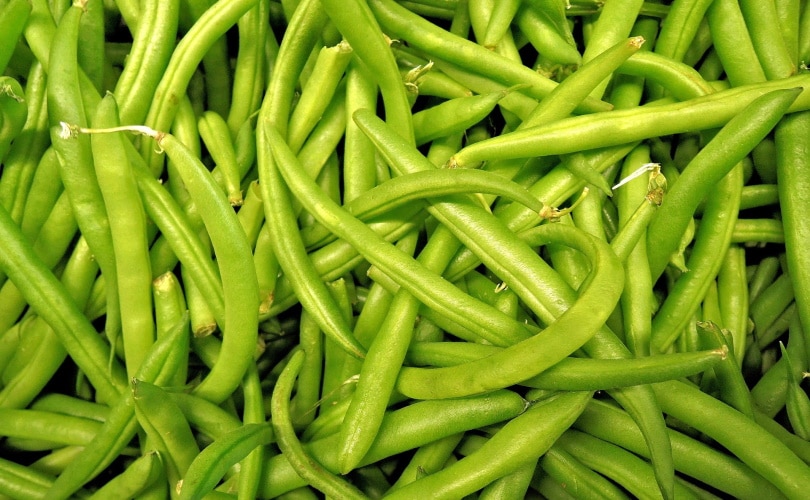
Adopting a rabbit also means taking on the responsibility of providing healthy, nutritious food for them. Because a rabbit’s digestive system is so different from ours, it can be hard to know what foods are best for them and those that might cause them harm.
Rabbits are herbivorous, meaning that they’re well-adapted to live on a diet consisting solely of plants. Whereas humans find it difficult to digest large quantities of raw plants, rabbits require nearly 80% of their diet as fresh, raw hay. But what about green veggies, like green beans? While green beans are acceptable as an occasional treat, they shouldn’t be eaten in large quantities. By the end of this guide, you’ll be ready to decide whether green beans are the right choice to incorporate into your rabbit’s diet.
Yes! Rabbits Can Eat Green Beans — But Should They?

Rabbits’ powerful plant-digesting systems enable them to eat almost any vegetable. Their appetites back this up too. However, not every vegetable is safe for rabbits to consume, and certain varieties should only be offered in limited quantities due to their high carbohydrate or fructose content. Many rabbits are adventurous eaters, willing to nibble on just about anything. Therefore, as loving rabbit parents, we should carefully choose what we offer to them.
It’s true that rabbits can eat green beans, but they should only be given as occasional treats. This is because any type of bean (including green beans) can cause indigestion and gas in rabbits. In the worst-case scenario, this can lead to GI stasis, a potentially fatal condition requiring a visit to your veterinarian.
Nutrition Facts for Green Beans
According to Nutrition Value, green beans are rich in a variety of essential nutrients:
- 2.7% fiber (which is not super high for a rabbit)
- Vitamins A, C, and K
- Calcium, phosphorus, iron, and magnesium
For individual rabbits that can digest them, green beans can be a valuable supplement to a diet rich in timothy hay.
Health Benefits and Dangers of Green Beans for Rabbits
Dietary fiber is especially important for any rabbit’s diet, as it ensures an even flow of food through the stomach and intestines. Green beans seem to be well-suited to add fiber to your diet, as there are almost 3 grams of fiber in every 100-gram serving of the beans. However, this is not enough fiber for a rabbit.
Also, the risk that green beans can cause indigestion or gas in your rabbit makes it a less-than-ideal food to serve on a regular basis. You should only offer green beans on occasion and in a mixture of leafy greens, which itself needs to be less than 10% of their diet.

How to Feed Green Beans to Your Rabbits
If you decide to introduce green beans to your rabbit’s diet, it’s vitally important to do so slowly. Offer just one bean pod, and let your rabbit eat the very fibrous and healthy husk as well.
After this, monitor your rabbit closely for signs of gastrointestinal distress. If your rabbit stops pooping, stops eating hay, or begins to have diarrhea, stop feeding them green beans immediately.
On the chance that your rabbit’s digestion handles green beans well, you can feel free to give them as occasional treats. Remember to offer them along with a variety of leafy greens that do not represent more than 10% of your rabbit’s diet (80% of their diet should be hay).
Types of Green Beans to Feed Your Rabbit
Whenever you’re at the grocery store choosing fruits or veggies for your rabbit, always look for organic produce. It’s less likely to be covered in the pesticides or waxes of non-organic produce, making it a healthier option for your rabbit’s digestive system.
Only feed your rabbit fresh green beans. Frozen green beans are widely available but not at all suitable for your rabbit’s sensitive digestive system. Likewise, you should never attempt to feed your rabbit canned or dried green beans.
Final Thoughts on Feeding Green Beans to Your Rabbit
Green beans make decent additions to your rabbit’s diet and can provide variability. However, they should only be offered in moderation and along with a small mix of leafy greens and a large amount of hay. Keep a close eye on your rabbit to ensure that they can tolerate green beans. Introduce them to your rabbit’s diet slowly, and ensure that they always have hay available. Stop feeding green beans to your rabbit immediately if there are any signs of digestive distress.
Related Reads:
- Can Rabbits Eat Asparagus? What You Need To Know!
- Can Rabbits Eat Cauliflower? What You Need to Know!
- Can Rabbits Eat Zucchini? What You Need to Know!











